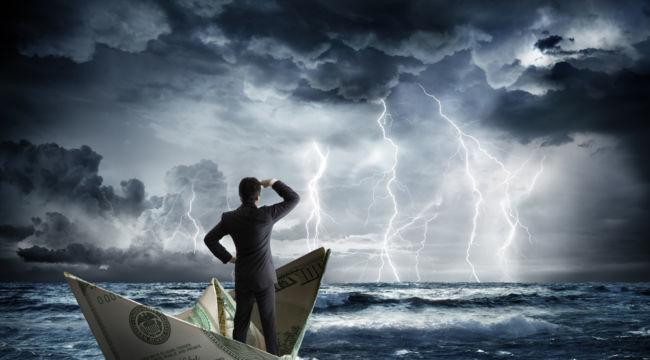by Nick Giambruno, Senior Editor via Doug Casey’s International Man
Below I continue my discussion with Jim Rickards, author of the must-read book The Death of Money. To catch part I of this interview, see here.
Nick: Tell us your take on some of the recent geopolitical events with Russia and China, vis-à-vis the international monetary system. What should we look for next?
Jim: We all see what’s going on in Russia. They’ve invaded Crimea. No one in the United States—left, right, or center—thinks the US should respond militarily. That’s not going to happen, but the US doesn’t want to be seen to be doing nothing, and so the US is engaged in financial sanctions, which is a form of financial warfare. The big difference between Russia and Iran—and of course the US has been in a financial war with Iran since 2012—is that Iran wasn’t in a position to fight back, whereas Russia is. If the US escalates its sanctions against Russia, Russia is in a position to do a lot of things. They could dump their US Treasury holdings; they could freeze US assets in Russia; and at the extreme, they could actually unleash Russian hackers and actually shut down the New York Stock Exchange.
So you have this, which is pretty much a replay of the Cold War, when both sides had enough missiles to destroy the other, but you didn’t want to strike first, because the other side could strike back with their extra missiles, their so-called second strike capability, and both countries would be destroyed. This was called “two scorpions in a bottle.” You put two scorpions in a bottle: one stings the other and the victim will die, but it has just enough strength right before it dies to sting back, and they both die. That was the doctrine of mutually assured destruction or MAD during the cold war. So now we have mutually assured financial destruction, and I do see the US a little surprised by this. I thought the US would tread carefully, but they do seem to be escalating the sanctions against Russia—actually having some serious impact, so you can be sure the Russians will strike back. And if there’s more escalation, this could ultimately lead to the point of where there are very serious consequences for the dollar, or catastrophic consequences for the global financial markets.
Then finally over to China. We all know what’s been going on in China. They’ve been buying enormous amounts of gold furiously—as fast as they can. We’re talking about thousands of tonnes. Officially China says it has 1,054 tonnes; they announced that in 2009. But there’s very good evidence—and I talked about all of this in my book, The Death of Money—there’s very good evidence that they have secretly acquired perhaps 3,000 or even 4,000 tonnes of additional gold since then. We see this mostly in the form of Chinese gold mining output, imports through Hong Kong, and the use of intelligence and military assets to bring in gold off the books. So putting it all together, they’ve acquired an enormous amount of gold, but they don’t want to trash the dollar. They have $3 trillion of US dollar-denominated paper, so they’re probably the biggest supporters the dollar has, but they look at the United States and see that the US is actively trying to undermine the value of the dollar because the US is trying to create inflation. Remember, 10% inflation would represent a $300 billion wealth transfer from China to the United States. China is hedging its positions by buying gold.
Putting all this together, we have Saudi Arabia backing away from the petrodollar, US confronting Russia in a financial war, and China acquiring gold to hedge against the dollar collapse. You can look around the world and see a lot of forces. So when the next crisis comes—we can expect it sooner than later—there’s a large group, really most of the world, that wants to walk away from the dollar. That would lead very quickly to a dollar collapse.
Nick: Recently, Senator Carl Levin was talking about using the Foreign Account Tax Compliant Act, or FATCA, as a way to indirectly sanction Russia. What are you looking for next in terms of what the Russians will do?
Jim: Well, that’s another hare-brained scheme. What does FATCA actually do? FATCA is a new law—it was passed in 2010, but it hasn’t come into effect yet—it’s supposed to come into effect July 1, 2014. But the fact is, basically it orders every country in the world to enter into a tax information-sharing agreement with the United States to the satisfaction of the United States. If you do not do so, if you fail to do so, then any interest payments on your securities to parties in your country will be subject to a withholding tax at the source, and the rate is fairly high. I think it’s 30%. And so now Russia was actually in the process of negotiating such a treaty with the United States, but that negotiation was blown up by the confrontation over Crimea. As of now, Russia has no such agreement with the United States, which means that come July 1, Russia will not be in compliance with the dictates of US law, which means that interest payments on Treasury securities to account holders in major Russian banks such as Sberbank and VTB will be subject to this withholding. So what would you do? Well, you would dump the Treasuries, because you don’t want to sit there and hold the Treasuries, if they’re going to be subject to a withholding tax. So basically it’s a way to force the Russians to dump US Treasuries, which increases US interest rates, which hurts our housing recovery and hurts our stock markets. This is like pointing a gun at your own head and saying, “If anyone moves, I’ll shoot.”
Nick: Yeah, it’s ridiculous. Shifting gears, we often talk a lot about the financial effects of the anticipated collapse of the international monetary system, but let’s talk about the sociopolitical effects. In your book you stated, “In the ontology of state power, order comes before liberty or justice.” You want to expand on what that means for those living in the United States?
Jim: In a stable world or a society, you can have liberty and you can have justice; but if society begins to break down, if there are money riots (which I expect), if there’s social unrest—the kind of thing we’ve seen in recent years in Greece and Europe but on a much larger scale: we’ve seen it in Turkey; we’ve seen it actually all over the world, except in some of the developed economies and the US—but if that breaks out, don’t expect the United States government to just sort of roll over and say, “We hear you; we’re going to get rid of inflation and have a stable dollar.”
States don’t go down without a fight, so what you could expect is a kind of neofascist response—executive orders, suspension of civil liberties, you know… just look at your local police force. These are not people who get kittens out of trees. They are in many cases heavily armored, with armored personnel carriers, body armor, night vision goggles, flash bang grenades, high-tech battering rams, surveillance drones, automatic weapons—these are people who are ready to break down your door.
And so what I expect is that as the financial system collapses, the elites will try the SDR, but it will be hyperinflationary. There will be a critical point at which governments will have a decision. If they want to return to something like a gold standard and reestablish confidence in money and rebuild an economy based on real growth as opposed to phony derivatives growth and unsustainable credit driven growth, then you might be able to get society back on the right course. But if, in fact, you want to continue with these money games and social unrest grows, then you should expect something that more closely resembles neofascism. History shows that most people go along with it. They just want to keep their jobs, they want to keep their heads down, they’ll do what they’re told, and so don’t expect a large uprising. We’ve seen this time and again in history.
You know, Nick, I say a lot of things and I write about a lot of things in my book that sound a little bit apocalyptic, in fact, but they’re not. You could look at history, and it’s happened over and over again. There’s no reason not to expect it in the future.
Nick: Yeah, you’re absolutely right; and that’s precisely why we focus on international diversification strategies here at Doug Casey’s International Man. I’d urge our readers to pick up a copy of The Death of Money so that they can better understand the coming reshuffle in the international monetary system and how it affects them.
Jim, thank you again for your time.
Jim: Thank you, Nick.


















